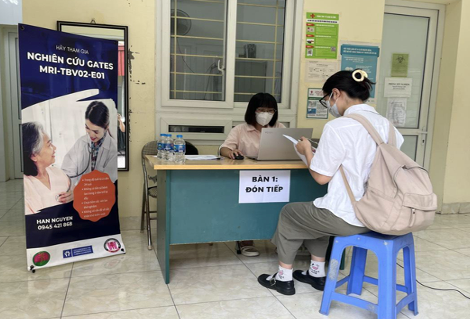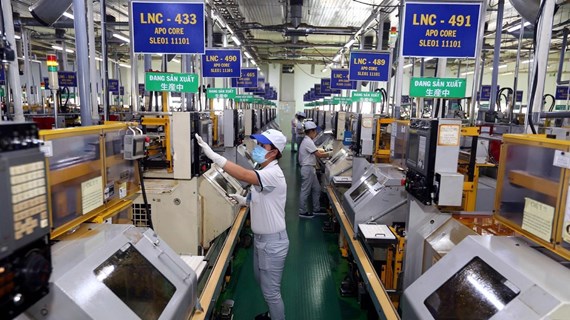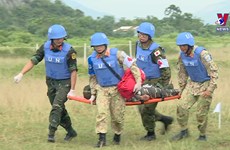Vietnam among seven countries entering phase 3 of TB vaccine trials
 A checkup under TB vaccine trial for adolescents and adults in Hanoi in August 2023. (Photo: VietnamPlus)
A checkup under TB vaccine trial for adolescents and adults in Hanoi in August 2023. (Photo: VietnamPlus)Hanoi (VNA) – Vietnam prioritises the development of new vaccines against tuberculosis (TB) and is one of seven countries actively participating in phase 3 clinical trials of M72, a health official has said.
Dr. Dinh Van Luong, Director of the National Lung Hospital, who is also head of the National TB Control Programme, made the remarks while addressing a high-level strategic roundtable on the establishment of WHO’s TB Vaccine Accelerator Council, which took place within the framework of the UN General Assembly’s meeting on the fight against TB in New York on September 23.
The senior doctor also affirmed Vietnam’s commitment to taking a pioneering role in joining efforts to conduct vaccine research and development.
 Dr. Dinh Van Luong, Director of the National Lung Hospital, speaks at the roundtable. (Photo: VietnamPlus).
Dr. Dinh Van Luong, Director of the National Lung Hospital, speaks at the roundtable. (Photo: VietnamPlus).The roundtable concluded with messages of hope, showing that for the first time in decades, there has been significant progress in vaccine development, opening up new opportunities in the fight against TB.
The participants also emphasised that after this event, all stakeholders need to respect and fulfill their commitments in order to work together to build a TB-free world.
Along with ministers from many countries, including Vietnam, France, South Africa and Pakistan, the roundtable saw the attendance of representatives from the Bill & Melinda Gates Foundation, the Welcome Trust Foundation, the World Bank, the African Development Bank Group, the European Investment Bank, the Global Fund, and Gavi - the Vaccine Alliance, among others.
 At the high-level strategic roundtable on the establishment of WHO’s TB Vaccine Accelerator Council. (Photo: VietnamPlus)
At the high-level strategic roundtable on the establishment of WHO’s TB Vaccine Accelerator Council. (Photo: VietnamPlus)The Vietnamese delegation to the event was led by Health Minister Dao Hong Lan, and included members of the steering committee for the National TB Control Programme.
Apart from the formation of the TB Vaccine Accelerator Council, the roundtable also offered an opportunity for the WHO to promote international commitments to and investments in the development of new TB vaccines.
According to WHO Director-General Dr. Tedros Adhanom Ghebreyesus, TB is one of the oldest diseases known to humanity, and remains one of the deadliest. Every year, TB kills more than 1 million people, and at least 10 million people fall ill with TB.
“It also has severe economic consequences. About half of patients experience catastrophic costs. Since 2000, 75 million lives have been saved through treatment for people with TB, and those with HIV co-infection,” he said.
“However, hunger and poverty, climate change, and protracted wars are further fueling the epidemic. The COVID-19 pandemic also disrupted services for TB, resulting in hundreds of thousands of excess cases and deaths.”
WHO estimates that over 25 years, a vaccine that is 50% effective in preventing TB disease among adolescents and adults could save 8.5 million lives.
It would also reduce the need for antibiotic treatment and save billions of dollars in costs faced by TB affected households, most of whom are poor and vulnerable.
 The Vietnamese delegation to the roundtable is led by Health Minister Dao Hong Lan. (Photo: VietnamPlus)
The Vietnamese delegation to the roundtable is led by Health Minister Dao Hong Lan. (Photo: VietnamPlus)Vietnam is currently ranked 11th among 30 countries worldwide with the highest burden of TB and multidrug-resistant TB.
The country detected 103,120 TB patients in 2022, up nearly 31% year-on-year, and 1.8% against that of 2020, proving the strong recovery of the National TB Control programme.
However, only 60% of the estimated TB patients in the community were detected. Given this, the programme needs the support of high-level leaders, as well as departments, and agencies to ensure sustainable financing is in order to provide access to quality diagnosis and treatment services for the remaining 40% and vulnerable groups./.













